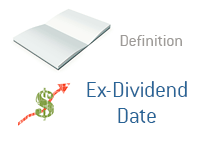Definition of Ex-Dividend Date
What does the term "ex-dividend date" mean? What is the definition of the term "ex-dividend date"?
Let's say that a major US bank regularly pays out a quarterly dividend.
You notice that there is an "ex-dividend date" of July 11th, 2013 for the next dividend payment. What does that mean?
 The "ex-dividend date" is the date on which a buyer of a stock will no longer be entitled to the next dividend payment.
The "ex-dividend date" is the date on which a buyer of a stock will no longer be entitled to the next dividend payment. So, if you bought shares of the aforementioned bank stock on July 11th, 2013, you would NOT receive the next dividend payment.
However, if you bought shares on July 10th, 2013, you would receive the next quarterly dividend payment.
There are four different dates that should concern you if you are holding a stock that pays dividends:
Declaration Date
Ex-Dividend Date
Record Date
Payable Date
Declaration Date is the day on which the company declares their upcoming dividend.
The ex-dividend date is the first day on which buyers of the stock will not receive the next dividend.
The record date is usually two business days after the "ex-dividend date". It takes a couple of days for trades to settle, which means that all shareholders of record as of the "record date" will receive the upcoming dividend.
Finally, the payable date is the day on which shareholders will receive the dividend payments.
--
Davemanuel.com Articles That Mention Ex-Dividend Date:
Stock Dividends - How Exactly Do They Work? Ex-Dividend Dates, Dividend Yields and More Explained
